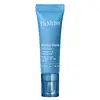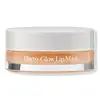What's inside
What's inside
 Key Ingredients
Key Ingredients

 Benefits
Benefits

 Concerns
Concerns

 Ingredients Side-by-side
Ingredients Side-by-side

Polybutene
Hydrogenated Polydecene
EmollientDiisostearyl Malate
EmollientSqualane
EmollientButyrospermum Parkii Butter
Skin ConditioningPolyethylene
AbrasivePhytosteryl/Isostearyl/Cetyl/Stearyl/Behenyl Dimer Dilinoleate
Skin ConditioningBis-Diglyceryl Polyacyladipate-2
EmollientCaprylic/Capric Triglyceride
MaskingHydrogenated Styrene/Isoprene Copolymer
Avena Sativa Kernel Oil
Skin ConditioningColloidal Oatmeal
AbsorbentPanthenol
Skin ConditioningSilica
AbrasiveCeramide NP
Skin ConditioningTocopheryl Acetate
AntioxidantCetearyl Alcohol
EmollientCI 77120
Cosmetic ColorantPentaerythrityl Tetra-Di-T-Butyl Hydroxyhydrocinnamate
AntioxidantPhenoxyethanol
PreservativeMentha Piperita Oil
MaskingLimonene
PerfumingCI 77491
Cosmetic ColorantCI 15850
Cosmetic ColorantCI 77891
Cosmetic ColorantPolybutene, Hydrogenated Polydecene, Diisostearyl Malate, Squalane, Butyrospermum Parkii Butter, Polyethylene, Phytosteryl/Isostearyl/Cetyl/Stearyl/Behenyl Dimer Dilinoleate, Bis-Diglyceryl Polyacyladipate-2, Caprylic/Capric Triglyceride, Hydrogenated Styrene/Isoprene Copolymer, Avena Sativa Kernel Oil, Colloidal Oatmeal, Panthenol, Silica, Ceramide NP, Tocopheryl Acetate, Cetearyl Alcohol, CI 77120, Pentaerythrityl Tetra-Di-T-Butyl Hydroxyhydrocinnamate, Phenoxyethanol, Mentha Piperita Oil, Limonene, CI 77491, CI 15850, CI 77891
Diisostearyl Malate
EmollientHydrogenated Poly(C6-14 Olefin)
EmollientPolybutene
Phytosteryl/Isostearyl/Cetyl/Stearyl/Behenyl Dimer Dilinoleate
Skin ConditioningCera Microcristallina
Emulsion StabilisingButyrospermum Parkii Butter
Skin ConditioningSynthetic Wax
AbrasiveAroma
Ethylene/Propylene/Styrene Copolymer
Persea Gratissima Oil
Skin ConditioningCopernicia Cerifera Cera
EmollientSimmondsia Chinensis Seed Oil
EmollientTheobroma Grandiflorum Seed Butter
Skin ConditioningSiraitia Grosvenorii Fruit Extract
Skin ConditioningRicinus Communis Seed Oil
MaskingAleurites Moluccanus Seed Oil
Skin ConditioningStearyl Glycyrrhetinate
Skin ConditioningTocopheryl Acetate
AntioxidantDiethylhexyl Syringylidenemalonate
Skin ProtectingButylene/Ethylene/Styrene Copolymer
Caprylic/Capric Triglyceride
MaskingPentaerythrityl Tetra-Di-T-Butyl Hydroxyhydrocinnamate
AntioxidantIsopropyl Titanium Triisostearate
EmollientCitric Acid
BufferingCI 77491
Cosmetic ColorantCI 77492
Cosmetic ColorantCI 77499
Cosmetic ColorantDiisostearyl Malate, Hydrogenated Poly(C6-14 Olefin), Polybutene, Phytosteryl/Isostearyl/Cetyl/Stearyl/Behenyl Dimer Dilinoleate, Cera Microcristallina, Butyrospermum Parkii Butter, Synthetic Wax, Aroma, Ethylene/Propylene/Styrene Copolymer, Persea Gratissima Oil, Copernicia Cerifera Cera, Simmondsia Chinensis Seed Oil, Theobroma Grandiflorum Seed Butter, Siraitia Grosvenorii Fruit Extract, Ricinus Communis Seed Oil, Aleurites Moluccanus Seed Oil, Stearyl Glycyrrhetinate, Tocopheryl Acetate, Diethylhexyl Syringylidenemalonate, Butylene/Ethylene/Styrene Copolymer, Caprylic/Capric Triglyceride, Pentaerythrityl Tetra-Di-T-Butyl Hydroxyhydrocinnamate, Isopropyl Titanium Triisostearate, Citric Acid, CI 77491, CI 77492, CI 77499
Ingredients Explained
These ingredients are found in both products.
Ingredients higher up in an ingredient list are typically present in a larger amount.
This ingredient is also known as shea butter. It is an effective skin hydrator and emollient.
Emollients help soothe and soften your skin. It does this by creating a protective film on your skin. This barrier helps trap moisture and keeps your skin hydrated. Emollients may be effective at treating dry or itchy skin.
Shea butter is rich in antioxidants. Antioxidants help fight free-radicals, or molecules that may harm the body. It is also full of fatty acids including stearic acid and linoleic acid. These acids help replenish the skin and keep skin moisturized.
While Shea Butter has an SPF rating of about 3-4, it is not a sunscreen replacement.
Shea butter may not be fungal acne safe. We recommend speaking with a professional if you have any concerns.
Learn more about Butyrospermum Parkii ButterThis ingredient is an emollient, solvent, and texture enhancer. It is considered a skin-softener by helping the skin prevent moisture loss.
It helps thicken a product's formula and makes it easier to spread by dissolving clumping compounds.
Caprylic Triglyceride is made by combining glycerin with coconut oil, forming a clear liquid.
While there is an assumption Caprylic Triglyceride can clog pores due to it being derived from coconut oil, there is no research supporting this.
Learn more about Caprylic/Capric TriglycerideCi 77491 is also hydrated iron III oxide. It's sole purpose is to give a red/pink hue to products.
Iron III oxides are classified as inorganic chemicals for coloring.
Synthetically created Ci 77491 is considered safer than those naturally found. This is because the synthetically created version may contain less impurities. Iron oxides are generally non-toxic and non-allergenic.
Learn more about CI 77491Diisostearyl Malate is an emollient and most often used in lip products. It comes from isostearyl alcohol, a fatty acid, and malic acid, an AHA.
As an emollient, Diisostearyl Malate helps create a thin film on your skin to trap moisture in. This helps keep your skin soft and smooth.
Pentaerythrityl Tetra-Di-T-Butyl Hydroxyhydrocinnamate (long name, huh?) is a synthetic antioxidant.
It is used to help stabilize other antioxidants or prevent the color from changing in a product.
As an antioxidant, it helps fight free-radical molecules. Free-radical molecules are capable of damaging our cells and other genetic material. Thus, antioxidants may reduce the signs of aging.
This ingredient is oil-soluble.
Learn more about Pentaerythrityl Tetra-Di-T-Butyl HydroxyhydrocinnamateWe don't have a description for Phytosteryl/Isostearyl/Cetyl/Stearyl/Behenyl Dimer Dilinoleate yet.
Polybutene is used to help control the viscosity of a product. This just means it helps adjusts the texture.
It is a polymer and does not get absorbed into the skin due to its large size.
Studies found this ingredient did not irritate skin in concentrations below 15%.
Learn more about PolybuteneTocopheryl Acetate is AKA Vitamin E. It is an antioxidant and protects your skin from free radicals. Free radicals damage the skin by breaking down collagen.
One study found using Tocopheryl Acetate with Vitamin C decreased the number of sunburned cells.
Tocopheryl Acetate is commonly found in both skincare and dietary supplements.
Learn more about Tocopheryl Acetate